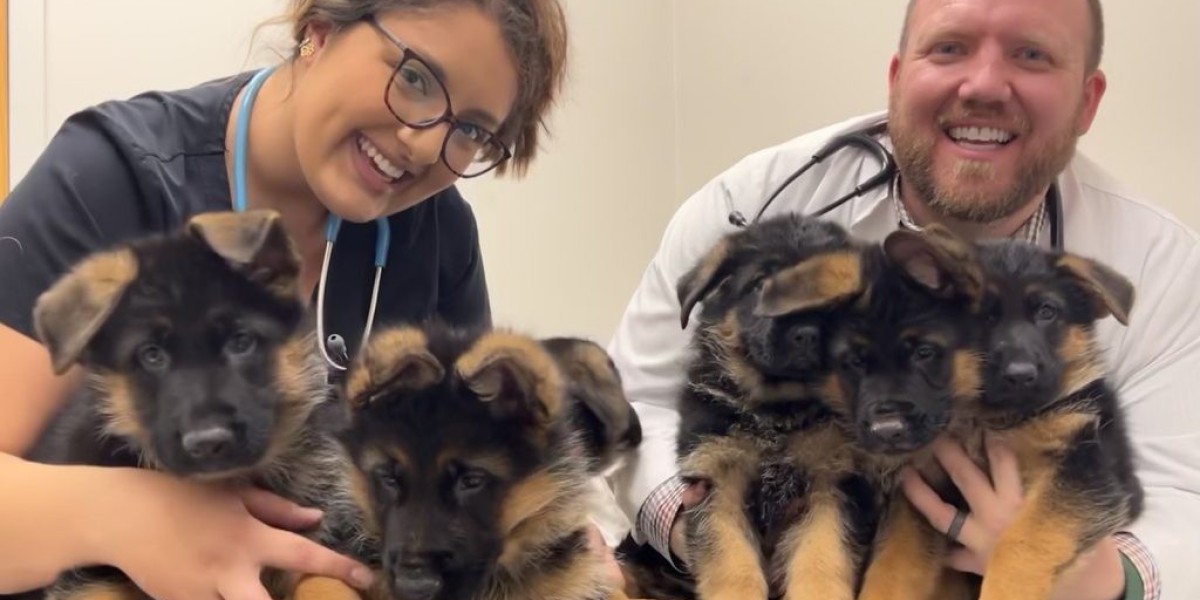When you buy a German Shepherd puppy, you're making a big commitment. You'll be responsible, for many years, for the health and training of your dog.
Pet stores and online sources offer puppies, which are typically from puppy mills that focus on profit over the welfare of animals. Choose a reputable breeding center instead.
Choosing a Reputable Breeder
It's important to be aware of your breeder before you purchase a German Shepherd puppy. Breeders who are responsible will be happy to give you information about their dogs and breeding practices. They'll be willing to discuss health and genetic testing as well as early socialization and the environment where their puppies are being raised.
Your local German Shepherd club or organization is the best place to start. The majority of breed clubs have a secretary or puppy officer who can direct you in the right direction for reliable breeders in your area. You can also contact your state animal control agency for an inventory of licensed breeders.
Take the time to meet with a breeder in person once you've found one that meets your breeding standards. Look for a clean facility in which the mother and her puppies are safe. Ask about the puppy's fathers and siblings; you want to see proof that they were examined for hereditary conditions such as hip dysplasia, eye issues, heart disease and Degenerative Myelopathy.
A responsible breeder will also be able to provide you with a copy of your puppy's medical records and an up-to-date shot schedule. They should have a great working relationship with a vet who can perform all necessary tests and vaccines. They should be able to give you the name of the veterinarian and phone number, and also give you a consultation note.
Ask the breeder about any concerns they may have about your lifestyle or living circumstances. This may prevent them from bringing the puppy to you. If they know that you have young children they might not want to sell you an German Shepherd puppy because they can be aggressive towards children.
You should also expect a reputable breeder to ask you to sign a contract to purchase your German Shepherd puppy. The contract should include details about the parents, their AKC registration number as well as the clause that allows them to return the puppy to the breeder. This is an excellent way for responsible breeders to keep track of their dogs and ensure they go to good homes.
Health Tests
Breeders who are reputable will test the health of the dogs they plan to breed. This is to ensure that they don't create pups that have an inherited illness. These tests include hip dysplasia and elbow dysplasia as well as degenerative myelopathy, GDV and bloat.
In addition to health screenings breeders who are trustworthy acquire a personal understanding of the health and temperament of each dog they own. They also are able to freely and completely give this information to other breeders and potential buyers.
The Kennel Club's Assured Breeder Scheme requires members to perform certain tests on their dogs. The breed clubs for German shepherds also suggest that breeders take additional tests.
These tests check for genetic disorders that affect the German Shepherd Dog as a whole. These tests also allow breeders make better mating decisions that will decrease the likelihood of hereditary diseases in future generations.
Typical genetic tests include
Hip Dysplasia
German Shepherds are prone to elbow and hip dysplasia, especially in the front limbs. These joint conditions that are degenerative cause discomfort and pain, but can be managed by the control of weight, exercise restrictions as well as supplements and medications. X-rays are taken with anesthesia to ensure exact results. Then, they are sent to the Orthopedic Foundation for Animals (OFA).
The OFA test checks for hemivertebrae, butterfly vertebrae, block vertebrae, lumbar-sacral vertebrae (LSTV), spondylosis, and spina bifida. The test isn't foolproof however, and it cannot determine if a dog will develop degenerative myelopathy or other spinal diseases later in life.
Socialization
GSDs require a lot of physical activity in addition to training and mental stimulation to keep them occupied. They can easily become bored and a lack of exercise may lead to destructive behaviors like excessive digging or eating shoes. Often, these behaviors are a result of not being able to satisfy their emotional needs. Socialization early is essential for German Shepherd pups. A good socialization program allows the puppy to build confidence with new people and environments. It also decreases the chance that the puppy will be scared or aggressive in new situations.
Puppy socialization begins with mother and her littermates as they play and interact. This teaches the puppies appropriate social cues and how to deal with their boisterous, SchäFerhund BeschüTzerinstinkt, Entzckendescferhundwelpen-Wec35D.De, sometimes rough, siblings. They are also exposed to a variety of sights, smells and sounds. The puppies learn how to behave appropriately in a group environment, which is essential to their success as adult dogs.
Introduce the puppy to a variety of household sounds, like vacuum cleaners, kitchen appliances, and doorbells. The puppy should be exposed sounds outside, including traffic, sirens and construction. This is crucial to ensure that the puppy does not become scared or anxious of these sounds as an adult. The puppy will be exposed to these stimuli at an ease pace and positive reinforcement will be used throughout the process.
It is also crucial for a puppy to get to know many different people over this time, as well as other pets. This can help prevent separation anxiety when the owner is away from home. This can be accomplished by taking the dog to puppy classes, dog parks or play dates with other dogs.
The puppy should be allowed to interact in a controlled, secure manner with other dogs. At first, the interactions should be limited so that the pup isn't overwhelmed. The puppy should also be able to be around calmer, older and gentle dogs. This will help the puppy realize that not all larger, older dogs are scary and it will aid in developing an appropriate temperament.
Training
German Shepherds require regular, strict obedience training. It is essential to enroll them in classes as soon as you can and especially when they are still young. This will assist them in developing into confident, well-mannered dogs. It's also a good time to introduce them to basic commands, such as sit down, stay and sit. The earlier you begin teaching your dog these basic commands they'll be more likely to obey your instructions as they age.
Territorial aggression is an issue in many families with German Shepherds. They may be overly protective of their homes and property, which can lead to barking or growling at people or animals that enter their territory. Proper training, exercise and socialization can reduce territorial behavior.
Other behavioral problems can be prevented through obedience training for German Shepherds. Dogs that don't possess the proper obedience training can become a nuisance and even a threat to their family members and their neighbors. They can easily be distracted by other pets, toys or children and disregard basic commands like "sit" or "down."
During the puppy years, you should continue to introduce your German Shepherds to new people, places and sounds. This is particularly important before they reach the age of 16 weeks because they are in an important phase of brain development during this time. If your German shepherd is a quiet puppy prior to this, it will likely be more difficult for them to learn new things as an adult. They could also be more susceptible to fear-based aggression or anxiety.
 One thing that many dog owners aren't aware of is that a German Shepherd needs lots of physical and mental exercise to remain calm and content. German Shepherds are herding breeds by nature, and are driven to please their owners and work. If they don't exercise enough, they may become bored or even destructive. Regular exercise helps tone muscles, decreases "cabin fever," improves circulation and helps with weight loss. It's also a great way to strengthen the bond between you and your German shepherd!
One thing that many dog owners aren't aware of is that a German Shepherd needs lots of physical and mental exercise to remain calm and content. German Shepherds are herding breeds by nature, and are driven to please their owners and work. If they don't exercise enough, they may become bored or even destructive. Regular exercise helps tone muscles, decreases "cabin fever," improves circulation and helps with weight loss. It's also a great way to strengthen the bond between you and your German shepherd!








